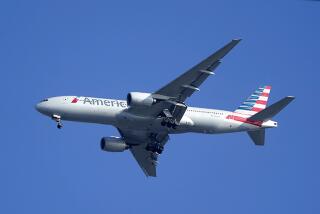FAA Told to Re-Evaluate Noise Policies
- Share via
WASHINGTON — A federal appeals court has ordered the Federal Aviation Administration to establish consistent standards for exempting airplanes from noise-control rules.
The U.S. Circuit Court of Appeals for the District of Columbia, ruling Friday in two separate cases, said the FAA has authority to grant exemptions, but has been doing so in a “grossly inconsistent way.”
The cases were brought by airlines unhappy with FAA implementation of noise-control standards that took effect last January 1.
In one case, Delta Air Lines, American Airlines, Transamerica Airlines and the Flying Tiger Line argued that the FAA had no authority to grant exemptions from noise-control regulations except in the “most exceptional circumstances.”
Object to Lenient Treatment
Many of the larger airlines have purchased new planes to meet the rules and object to lenient treatment of small aircraft.
In the second case, Carefree Vacations, Inc., Worldwide Airlines and Airmark Corp. urged the court to relax the FAA policy so that small carriers without much money would not be forced to ground their planes.
Writing for the court, Judge Edward Tamm said the FAA has “broad authority” to grant or deny exemptions but “has utterly failed to provide a consistent approach that would allow even a guess as to what the decisional criteria are or should be.”
“The FAA’s application of the exemption criteria can only be described as grossly inconsistent and patently arbitrary,” he said.
The court sent the case back to the FAA to re-evaluate its exemption policy and review the exemption requests filed by small carriers.
Federal Aviation Act
Under legislation passed in 1968, airlines were required to reduce engine noise by replacing old planes, refitting them with quieter engines or attaching to the engines “hush kits,” which have sound-absorbing materials.
Most small air carriers that could not afford to replace their aircraft chose to purchase the hush kits, but delivery on those kits is not expected until later this year.
As of last February the FAA had received exemption requests for 300 planes that are awaiting installation of hush kits but had granted only 15 waivers.
Insistence on the January 1 deadline “is technologically impracticable” because hush kits are not yet available, attorneys for the small carriers told the court.
But the judges disagreed, noting that the FAA set its final deadline eight years in advance “to force the industry to develop commercially available hush kits.”
More to Read
Inside the business of entertainment
The Wide Shot brings you news, analysis and insights on everything from streaming wars to production — and what it all means for the future.
You may occasionally receive promotional content from the Los Angeles Times.










